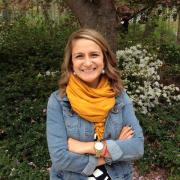![[IMAGE DESCRIPTION: A young child with shoulder length black hair wears a light blue dress, sits on the floor with bright color blocks, and laughs.]](https://www.momsrising.org/sites/default/files/styles/large/public/Asian%20child%20laughing_unknown.jpg?itok=wjuMAEHQ)
Make your child care center a “safe space” from immigration enforcement
If federal immigration agents came to your family’s child care program to arrest or interview a parent or staff member, would program staff know what to do?
Would they know that immigration agents are generally restricted from entering their centers?
An unwelcome, unexpected visit from immigration agents or other law enforcement officials would be scary for children and adults. But having a plan in place—and communicating that plan to staff and parents—can help to ensure the safety and privacy of children, families, and staff in early childhood programs.
A new resource from the Center for Law and Social Policy (CLASP) provides early childhood programs with the information and tools they need to develop such a plan. A Guide to Creating “Safe Space” Policies for Early Childhood Programs explains federal agency guidance on “sensitive locations,” provides information about designing and implementing “safe space” policies, and includes sample policy text that early childhood providers can adapt for their programs.
What is a “safe space” policy?
A “safe space” policy is a plan or set of protocols to safeguard early childhood programs against immigration enforcement actions and protect families’ safety and privacy. Safe-space policies reinforce basic constitutional protections and federal agency guidance related to immigration enforcement actions at sensitive locations. They also hold immigration agents accountable to their internal policies.
What federal policies or laws protect early childhood programs from immigration enforcement?
Early childhood programs—such as “known and licensed” child care, preschool, pre-kindergarten, and Head Start—are classified as sensitive locations. In general, Immigration and Customs Enforcement (ICE) and Customs and Border Protection (CBP) agents are expected to avoid conducting enforcement actions at these and other sensitive locations. This means that, except in exigent circumstances, agents must have prior approval to conduct enforcement actions on your center’s property.
What if my child attends a home-based child care program?
ICE and CBP don’t concretely define what it means for an early childhood program to be “known and licensed.” Based on our best interpretation, “known” doesn’t refer to whether a program is registered or regulated; rather, it’s more about whether an agent could visually identify the facility as a child care or preschool program. We can’t say for certain that any home-based program—licensed, regulated, or otherwise—would be included under the policy. But home-based programs should still have a plan in case enforcement actions occur in their neighborhoods and know their rights in the event of a home raid.
What would implementing a “safe space” policy entail?
Safe-space policies are grounded in the basic security and privacy protocols that licensed or regulated programs already have in place. Programs should review—and strengthen, if necessary—existing policies on storing and releasing private information about parents, children, and staff; how authorized staff, parents, and visitors access the facility; procedures for unauthorized visitors; communicating urgent information to staff and parents; and emergency contacts.
Safe-space policies build on these basic security protocols, giving specific consideration to what would happen if an immigration agent requested access to a facility or information about a parent, child, or staff member. A strong policy identifies key roles and responsibilities for staff—including who is authorized to speak with immigration agents or other law enforcement agents—and lays out procedures for interacting with these officials. It also includes protocols to minimize disruption for children and expectations for keeping parents up-to-date.
Our guide includes extensive information about designing and implementing a policy, including a template policy that programs can adapt. CLASP is available to advise programs interested in developing a safe-space policy. If you have questions or would like us to review a draft policy, please contact Rebecca Ullrich (rullrich@clasp.org).
Urge your family’s child care program to adopt a “safe space” policy today!
Early childhood programs should be a safe place to learn and grow for all children—no matter their families’ immigration status. All parents should feel comfortable bringing their children to child care, knowing the program has their best interests in mind. Safe-space policies help early childhood programs prepare for the unlikely but not impossible event of enforcement actions occurring on their property. These policies also demonstrate that programs care about immigrant families’ wellbeing and are taking steps to ensure their safety, even if no such actions should occur. Share our guide with your program and encourage the director to adopt a safe-space policy today!



The views and opinions expressed in this post are those of the author(s) and do not necessarily reflect those of MomsRising.org.
MomsRising.org strongly encourages our readers to post comments in response to blog posts. We value diversity of opinions and perspectives. Our goals for this space are to be educational, thought-provoking, and respectful. So we actively moderate comments and we reserve the right to edit or remove comments that undermine these goals. Thanks!